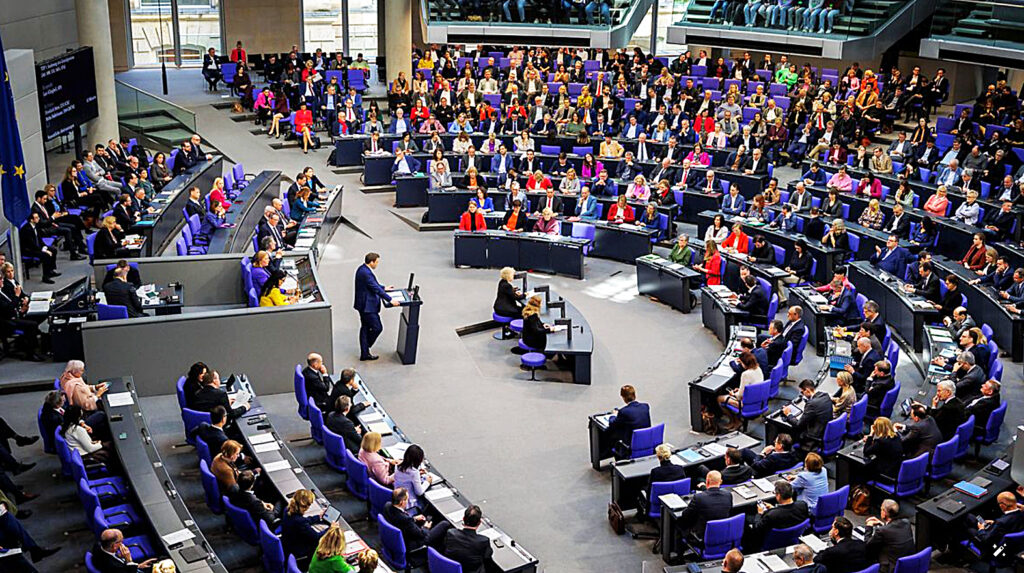Introduction
Germany, long considered the economic powerhouse of Europe, now finds itself in a state of stagnation, political fragmentation, and growing social unease. After two consecutive years of negative GDP growth, a weakened coalition government, and the stunning rise of the far-right Alternative für Deutschland (AfD), the country’s famed stability is under threat. As Berlin struggles to revive growth and unity, questions mount: Can Germany reclaim its leadership role in Europe, or is the once-reliable engine of the EU stalling for good?
A Shrinking Economy
Germany’s economy has shrunk for two consecutive years—2023 and 2024—marking its worst performance since the early 2000s. The country faces what many economists call a “slow-motion crisis”: high inflation, deindustrialization fears, energy price shocks, and a slowing export sector. According to AP News and Reuters, the German economy contracted by 0.3% in 2023 and an estimated 0.2% in 2024, with early 2025 forecasts predicting flat or marginally negative growth.
The pain is widespread. German industry has been hit hard by reduced demand from China and high energy costs stemming from the end of Russian gas imports. Domestic demand remains weak, as inflation erodes purchasing power and consumer confidence. A 2025 survey by the Ifo Institute found that 70% of Germans are worried about the economic future, and 68% believe the political class is failing to address the crisis.
Political Paralysis and the Coalition Collapse
Chancellor Olaf Scholz’s three-party coalition—made up of the SPD, the Greens, and the Free Democrats (FDP)—collapsed in late 2024 after months of infighting over budget reforms and borrowing limits. The internal disputes came to a head when the Constitutional Court ruled against a proposed budget maneuver, leading to a crisis over how to plug a multi-billion-euro shortfall. The FDP walked out, forcing Scholz to call early federal elections for February 2025.
According to Politico Europe, the ruling coalition had become so dysfunctional that even basic governance stalled, with ministers openly contradicting each other in the press. In the February 2025 election, the center-right CDU led by Friedrich Merz won a narrow plurality, but the real shock came from the AfD, which surged to over 21% of the vote—its best result ever.
The Rise of the Far-Right
The AfD’s rise is a seismic event in post-war German politics. Once considered a fringe movement, it is now a major national force. The party has capitalized on public discontent over inflation, migration, and what it calls the “green diktat” of Berlin elites.
In eastern Germany, the AfD won first place in several states, and polling shows that nearly one in three young men under 30 now support the party. Analysts from Der Spiegel and Die Zeit warn that the AfD’s normalization risks fracturing the political consensus that has held since the Cold War.
While mainstream parties have ruled out governing with the AfD, local-level collaborations are already occurring in some municipalities, signaling a potential erosion of the traditional “cordon sanitaire.”
Economic and Social Risks Ahead
Germany’s challenges are not limited to GDP. The country faces demographic decline, with a rapidly aging population and acute labor shortages. The working-age population is shrinking, while pension and healthcare costs soar. Meanwhile, Germany’s famed Mittelstand—the small and medium enterprises that form the backbone of its economy—are struggling to compete in a more digitized and globalized world.
Energy security remains fragile despite efforts to diversify. The government’s green transition has faced criticism for being too fast and poorly planned, especially after the abrupt shutdown of nuclear plants. Industrial leaders warn that the country risks “green deindustrialization” unless reforms are made.
Conclusion
Germany stands at a pivotal crossroads. Politically, the fragmentation of its party system and the normalization of the far-right represent a historic shift. Economically, the country must tackle stagnation, labor shortages, and an aging population without abandoning its environmental goals. Whether the new government can form a stable coalition and address these systemic challenges will determine if Germany can reclaim its role as the anchor of Europe—or continue down a path of drift and division.



